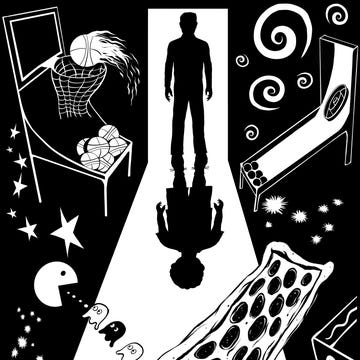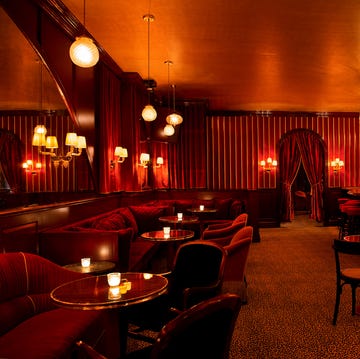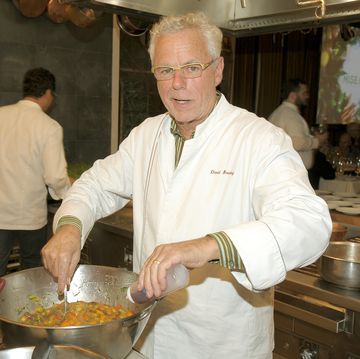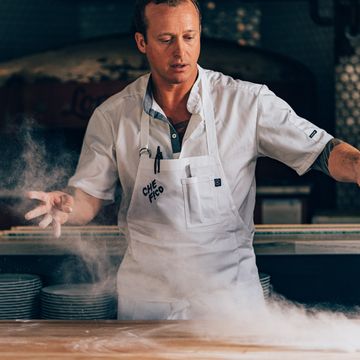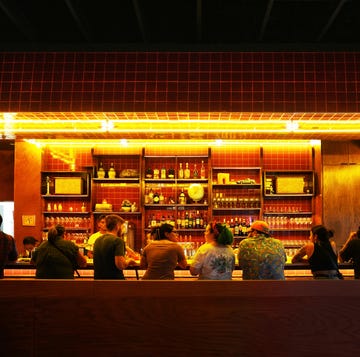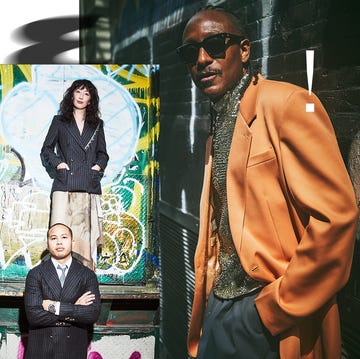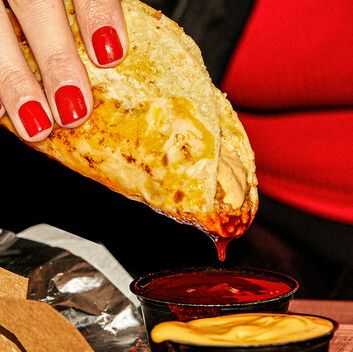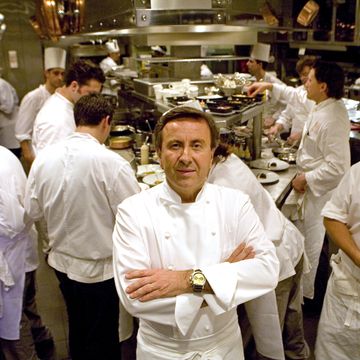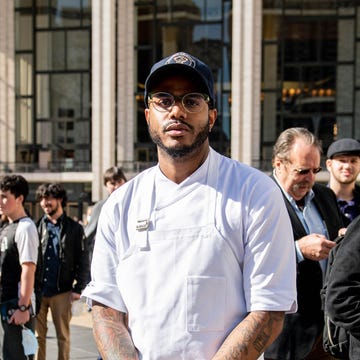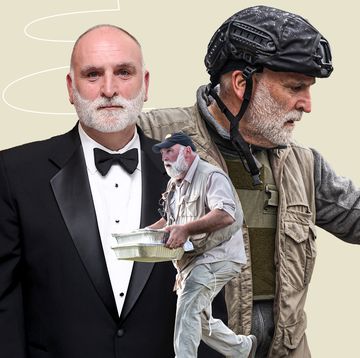“I’m Rocco DiSpirito, one of those fancy New York chefs.” Rob Katz and I listened intently to the twenty-four-inch Panasonic TV, one of the few survivors of a demolition of our new restaurant space, as Mark Burnett heralded a new era of the TV Chef on NBC’s new reality show The Restaurant.
The year was 2003, and it was four weeks before opening Boka, a contemporary American restaurant in Chicago, and four “unscripted” drama-filled episodes before Rocco’s. Rob, my business partner, and I bellied up to our new bar, watching Jeffrey Chodorow manage his New York empire while the two of us sketched out the beginnings of what we hoped would be ours.
Chicago was having a moment in the food world, as molecular gastronomy had drifted to the Midwest from Spain and landed in the kitchens of Grant Achatz, Graham Elliot, and Homaru Cantu. The city was shedding its image of deep-dish pizza and old-school Italian and had begun sharpening its knives, or, better yet, starting its liquid-nitrogen engines, in more serious culinary pursuits.
We had set our sights on something much less ambitious. Rocco and these fine TV Chefs were looking to be Tom Cruise. We were perfectly content with being the restaurant version of Gary Sinise, authentic and dependable, the man whose theater, Steppenwolf, was right across the street from us. Opening a restaurant is already a leap, but what they were doing seemed more like jumping out of an airplane. I didn’t have the stomach for that...yet.
As we gathered as a staff for the first time, it was apparent that our group, much like Rocco’s, was straight out of central casting.
Scratch most restaurateurs and you’ll reveal an addict. Rare is the owner-operator who’s satisfied with just one restaurant, or who doesn’t find momentary satisfaction in surmounting a crisis, whether in business or on the service floor. In some way, the same is true of most people who work in hospitality: the servers, bartenders, general managers, line cooks, and everyone in between. The industry is the top employer of immigrants, single mothers, and, from my viewpoint, seekers of any industry in the country, and that includes me. I came to this life as the manic-depressive product of two mentally ill parents, looking for stability and happiness. What I found was a kinship with others who harbored a similar emptiness that somehow made them compatible with restaurant life. I guess once you’ve experienced real psychic trauma, a twenty-plate pickup or a bursting-at-the-seams station rarely triggers anything other than a rush of sweet, addictive adrenaline.
These left-of-center people I have spent my life with, restaurant folks, have always been my favorite people. If you’ve listened to Jerry Seinfeld talk about his peers in interviews, he makes it pretty clear that he likes very few humans outside of comedians. They are often just the type of brilliant but slightly damaged people you find in restaurants. I went to restaurants looking for a purpose, and what I found was a community and a home.
After saving enough money as a server at age twenty-two to open a cafe stuck together with bubble gum and Scotch tape, I started flipping restaurants, trading up each time in both size and sophistication. I went from six to twelve tables in the Florida Panhandle, opened in Springfield with twenty-five four-tops, and then landed with a thud with forty tables in Nashville, finally reaching my level of incompetence with a two-hundred seater. The three successes and one failure were all part of my hospitality master’s degree and ended up doubling as temporary homes with foster families, until I reached Chicago and met Rob Katz.
Boka was restaurant number one for us, and because we were unknown restaurateurs, we weren’t exactly the first choice for potential applicants. What we ended up getting on open-call day were wide-eyed prospects with no experience and the best servers from second-tier cities who had just moved to Chicago. They were perfect for us.
While Billy Joel’s “Piano Man” had his real estate novelist who never had time for a wife, we had Nathan the writer, who spoke, wrote, and drank like an aspiring Hemingway, and it was Ian who was quick with a joke or to light up your smoke from behind our twelve-seat bar.
We didn’t have a waitress practicing politics, but Donna did wait on the Obamas at table forty-five. She started with us at age twenty, and Boka was her first real server job. She was meticulous and measured. It was clear that the world was her oyster and that if she wanted to continue in this field, she would kill.
There was Paul, the aggressive drinking line cook, who would tell you about last night’s adventure at the bars while he cooked your food. I was always moving in and out of the kitchen, so I would only grab snippets of each story that when pieced together didn’t make much sense. It was a fun game for me to try to fill in the blanks.
“And then I ordered three shots.”
“And I was like, dude, you’re John Cusack. Serendipity fucking sucked.”
“I like Journey as much as the next guy, but come on, let’s collectively retire that song.”
“I mean, cheese sticks should come with marinara as a default.”
“And that’s how you get arrested at the Hollywood Grill.”
Paul was very twenty years ago, a guy whose volume and language wouldn’t fly in today’s restaurants, but to his credit, bloodied, bruised, sick, or hungover, he showed up and killed his station every night.
Pedro, an immigrant from Mexico, was a sight to behold. If you shot a video of him from open to close, there would never be a lack of movement. He would clear an eight-top unassisted, run more plates than any other server, and do it all with grace and absolute professionalism.
Many of our forty-person crew were the best that restaurants and humanity had to offer—Renaissance folks who knew a ton about food, wine, music, and film. They were the dropouts who read more than the graduates; they were interesting but splintered, bargain finds in the irregular bin. Compelling in a dangerous way, we were a punk band playing a church gig.
I had decided: Restaurant people were the most interesting folks in the world, and anyone else was boring as fuck in comparison.
The first customer I considered a regular was named David Bryant. He lived alone some three blocks away and would occupy bar seat number two, a spot that strategically grabbed conversation from the bartender, fellow customers, and the staff picking up drinks at the service bar. We sustained him with friendship and an open chair as an extended part of our family. He supported us through objectivity about new dishes and encouragement of new team members, and as an energetic Boka cheerleader beyond our four walls. His plaque on the bar, drilled in some ten years after opening, had less to do with his 1,065 dinners (according to OpenTable) and more to do with making us feel better about ourselves.
Hospitality is not always a two-way street. Two weeks into being open, one of the wealthiest Chicagoans grabbed me by the shoulders and screamed, “Make the food come out faster.” A month later, a grumpy septuagenarian put his hands on both the lapels of my poorly fitted suit, pulled me close to his mouth, and said, “Bring me my fucking food.”
Scared that their negative word of mouth might seriously affect my baby restaurant just months before the birth of my first real baby, I simply carried on. “We will get you your food right away. Sorry for the wait.”
With guests like them, I was never really sorry. Fortunately, I no longer play the dutiful servant with assholes.
On those nights when the love equation did not end up in our favor, we drank. To be fair, we also drank on the nights we felt like we won. We used to end Saturday nights playing a game we made up called “The Drive.” The Drive was a classic-rock radio station in Chicago on 97.1. Every hour, its marketing blip would say, “No one knows (fill in a classic-rock band) like The Drive.” We would all draft ten bands, alternating picks; turn on the station; and whoever’s band got played first won. It was a silly and fun way to end a grueling night of service. As we hooted and hollered around the bar with a spirit on the rocks, waiting for the next song, it never seemed like there was a defined hierarchy within the restaurant. Servers and bartenders, cooks and managers, ownership and busboys, we all played along. As Fleetwood Mac, a worthy Drive band selection, said in their 1976 hit, we were all just pieces of “The Chain.”
I never saw Paul again after 2008. He got into a skirmish with an off-duty cop one night at the bar and was thrown on his back. I’m pretty sure that ended his Boka tenure. Nathan lives on a working farm with his wife and his kids, and although he never finished his great American novel, he writes a lot of music and lyrics. Donna went on to open sixteen fast-casual restaurants called Brown Bag Seafood. Ian is the COO of our company. Pedro still works at Boka and is still a blur in the dining room.
My oldest daughter attended the opening inside her mother Cortney’s belly. She’s now twenty years old, attending college at Pepperdine, and about to start a summer restaurant gig. Part of my pitch is how much she will learn from the crew and from the public.
She will learn that Chicagoans have a really great bullshit detector, and if you have an aversion to authentically taking care of someone, they will sense it. She will find out that 15 percent of the people who walk in the door will be challenging humans, and that it will take extra effort and love to win them over. She will find out that being a great work teammate builds a camaraderie that’s different from school friendships.
I think I am the most excited about her meeting her own Pedros, Ians, Donnas, and Nathans. If she takes the best of all of them, it will serve her throughout her time on the planet.
For me, the restaurant business saved my life. I often found myself keeping the peace in my own home growing up. It was a training ground for hospitality. My house was too small and had too many hard surfaces for yelling and screaming. The arguing would reverberate off the walls and create a cacophony of anger that gave me a headache. I learned pretty quickly that when people had food in their mouths and drinks in their hands, they were less likely to combust.
The lessons learned in my sad little blue house in the 1970s and in the early days of Boka still apply today. Be nice. Be calm. Get cold drinks in their hand and hot food on the table. I didn’t know much twenty years ago, but I knew this.
I had dinner at Boka this past week. Chef Lee Wolen has helped turn it into a restaurant I could not be prouder of, and it opens to packed houses almost every single night. My dining companions, Kim Carnes and Dave Ellingson, who have doubled as surrogate parents for me for a couple decades, had not been back to Boka in many years.
“It appears as though both you and Boka are all grown up,” said Dave.
“Well, Boka certainly has, but I’m still working on it,” I chimed back.
As I walked out the door and saw the host podium I used to stand behind six days a week, I thought about myself twenty years ago: scared shitless, a new father, greeting every guest, trying to will it to be a success. A large part of me grew up there, and for that reason, Boka will always be more than a restaurant to me. It’s been a teacher, a friend, a sanctuary, and it smells and sounds and feels just like home.
Kevin Boehm’s first book, The Bottomless Cup, a memoir, comes out from Abrams in 2025.






